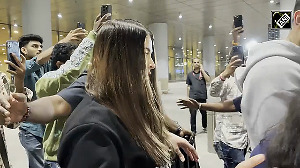Chauvinism, narrow-mindedness or self-righteous wrath? Amber Rahim Shamsi weighs in on the resentment bubbling over at the idea of Sania Mirza having married a Pakistani.
It's done. Sania Mirza is now Mrs Shoaib Malik. It is the happy ending the couple wanted, inspite of the soap operatic twists and turns so giddily documented in the Indian and Pakistani media. So enamoured has the public been of this story of cross-border love that it even trumped the dreary news of cross-border terrorism. India and Pakistan may not agree on the terms to resume dialogue, but our similar preoccupation with weddings underscores our cultural affinities regardless of our historic enmity.
A wedding is the thread weaving the fabric of subcontinental society. Whether it's the social calendar, status, relationships, films or television dramas, marriages and weddings determine how communities interact amongst themselves and with other communities. In the case of Sania and Shoaib, it's like a Shia marrying a Sunni: never mind that both are consenting adults and Muslim, should it matter that they are from different countries?
Here's another similarity between Indians and Pakistanis: the expectations of how a woman is meant to behave after her wedding. She is to adopt the name and customs of her husband and his family; her identity is meant to derive not from who she is and where she comes from but who she marries.
Thus the reactions on both sides of the border come from a similar source even if their manifestation has been different. The right-wing Shiv Sena was quick to condemn Sania, its chief proclaiming: "Had (Sania's) heart been Indian, it wouldn't have beaten for a Pakistani. If she wished to play for India, she should have chosen an Indian life partner."
The problem for the Sena is not just that Shoaib Malik is a -- sharp intake of breath -- a Pakistani, but that an Indian woman is choosing to sleep with the enemy. I doubt if the reaction would've been the same had a male Indian cricket star had picked a female Pakistani celebrity. Even the rumours of an affair between cricket legend Wasim Akram and model-turned-actress Sushmita Sen is enough to get the blood of your average Indian male boiling.
Let's take Bollywood films as a rough social gauge. They would have us believe love conquers the most recalcitrant of parents and transcends societal norms. Poor and rich. South and North. Police officer and the mafia don's baby girl. But when it comes to cross-border love, the wilting Pakistani girl melts into the arms of her Indian savior. Take the 1991 film Henna starring Rishi Kapoor and Zeba Bakhtiar (the Kapoors even bagged a bland Pakistani actress for the role!): Kapoor lands across the border and charms a dewy-complexioned Bakhtiar. Cut to 2004, when Shah Rukh Khan stutters his way into the affections of the Pakistani Preity Zinta and carries off his bride twenty years late into the Indian sunset. Male chauvinism meets nationalistic chauvinism? I doubt if any if these films would've resonated with the Indian masses had the genders been reversed.
In Pakistan, however, their union has even been given the official sanction. The right-leaning Pakistan Muslim League (Nawaz) held a demonstration in the Pakistani southern city of Multan to show support for the happy couple. Demonstrators chanted "Welcome Sania, Shoaib welcome", telling reporters Sania would be the daughter-in-law of all of Pakistan. Meanwhile Prime Minister Yousaf Raza Gilani is to send a gift and his best wishes to the star-crossed couple, and a parliamentary delegation including the very vocal Population Welfare Minister Dr Firdous Ashiq Awan. But while the image of the portly minister for population doing thumkas at the mehndi ceremony is enough for a giggle, it goes to show that Sania's gender has made it easier for the match to be accepted in Pakistan.
It is however, the statement of the Pakistan Tennis Federation chief Dilawar Abbas that is most revealing. He breathlessly hoped Sania would play for Pakistan because "Asian women traditionally follow their husbands, which is why I'm hopeful that someday she would be inspired by Shoaib to play for Pakistan."
So should Sania now give up her nationality as well as her family to be with her husband? Nowhere in the 'Marriage in the Subcontinent' rulebook does it say so. I doubt if the miniskirt-clad Mrs Malik would be able to play for Pakistan, let alone want to. Even in conservative India, her thigh-skimming skirts and bare arms had the conservatives up in arms. Remember that other Daughter-in-Law of Pakistan, Jemima Khan? She might've cruised the club scene of London in skimpy, sparkly dresses, but back home in Lahore she made sure the dupatta stayed put on her head.
Wisely, the couple has decided to do away with the problem of visas and national boundaries by settling in neutral Dubai. There, Sania will get to keep her wardrobe and her passport; her identity will not have to be consumed by her marriage. Still, when she's checking in her wedding trousseau at the Dubai airport, she'll find it hard to leave behind the baggage of history, nationalism and gender.
Amber Rahim Shamsi is an Islamabad-based freelance journalist.









 © 2025 Rediff.com -
© 2025 Rediff.com -